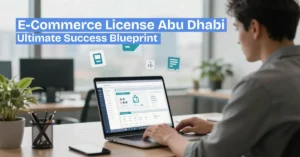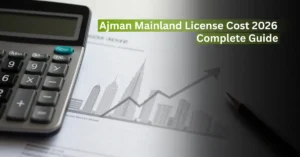Introduction
Dubai is one of the fastest-growing hubs for e-commerce, logistics, and food delivery. From groceries to restaurant meals, more people now prefer doorstep delivery. This trend has created a huge demand for delivery businesses. But before starting, every business owner must secure a delivery service license.
A delivery service license is more than just a legal requirement. It gives you the right to operate in Dubai, protects you from penalties, and allows you to build strong business partnerships. With this license, you can confidently expand, serve customers, and collaborate with restaurants, retailers, and online platforms.
Why You Need a Delivery Service License in Dubai
Starting a delivery company without a license is not an option in Dubai. The government has strict regulations for logistics and delivery services to ensure quality, safety, and consumer protection.
Here are the main reasons why a delivery service license is essential:
- Legal Compliance: It ensures your business operates within UAE laws.
- Customer Trust: Licensed businesses are more credible, helping you attract clients.
- Business Partnerships: Restaurants, e-commerce platforms, and logistics companies only work with licensed providers.
- Avoiding Penalties: Operating without a license can result in fines, bans, or business closure.
In short, this license protects your business and makes it easier to grow in Dubai’s competitive market.
Types of Delivery Service Licenses in Dubai
Not all delivery businesses are the same. Depending on your business model, Dubai offers different types of licenses.
Common delivery service licenses include:
- Courier License: For businesses that handle mail, packages, and small parcels.
- Food Delivery License: For restaurants, cafés, and cloud kitchens that deliver food.
- E-commerce Delivery License: For online stores delivering products to customers.
- On-demand Delivery License: For app-based platforms like Talabat, Deliveroo, or Careem.
License Types at a Glance
| License Type | Suitable For | Issuing Authority |
| Courier License | Packages, mail, documents | DED / Free Zone |
| Food Delivery License | Restaurants, cloud kitchens, cafés | DED / Municipality |
| E-commerce License | Online shops, retail delivery | Free Zone / DED |
| On-demand Delivery | Apps like Talabat, Careem, Deliveroo | RTA + DED |
By selecting the right license, you ensure your business is legally compliant and able to target the right customers.
Step-by-Step Process to Get a Delivery Service License in Dubai
Getting a delivery service license may sound complex, but when broken into steps, the process becomes straightforward.
Step 1: Choose Your Business Activity
First, define what type of delivery service you want to provide. Is it food delivery, courier services, or an e-commerce logistics setup? Choosing the correct activity helps you select the right license category.
You also need to decide whether to operate in the mainland or in a free zone.
- Mainland: Best for businesses targeting local markets and working directly with UAE-based restaurants or retail stores.
- Free Zone: Offers lower setup costs, 100% ownership, and tax benefits, but has restrictions on direct mainland operations.
Step 2: Pick a Business Structure
The business structure affects ownership, liability, and taxation. Common structures include:
- Sole Proprietorship: Owned by one person.
- LLC (Limited Liability Company): Most common choice, offering liability protection.
- Partnership: Involves multiple owners.
For delivery businesses, LLC is often preferred, as it allows expansion and flexibility.
Step 3: Register Trade Name
Your business name is your brand identity. It must follow Dubai’s naming rules:
- Avoid offensive words.
- Do not use names related to religion or politics.
- Ensure the name is unique.
Register your trade name with the Department of Economic Development (DED) or your chosen free zone authority.
Step 4: Apply for Initial Approval
Once your business activity and name are confirmed, apply for initial approval. This step shows that the authorities have no objection to your business idea. At this stage, you may need to submit a short business plan outlining your services.
Step 5: Get RTA Approval (for delivery vehicles)
If your business involves cars, vans, or motorcycles for deliveries, you need approval from the Roads and Transport Authority (RTA). This ensures your vehicles meet safety and environmental standards. For food delivery services, drivers must also follow RTA training and safety guidelines.
Step 6: Submit Required Documents
You must prepare and submit all required documents to the DED or free zone authority. Commonly required documents include:
- Passport copy of the business owner(s)
- Emirates ID and visa copy
- Trade name reservation certificate
- Ejari (office lease agreement), if applicable
- Completed application form
- No Objection Certificate (if applicable)
Step 7: Pay Fees and Collect License
After approval, you will receive a payment voucher. The cost depends on your business activity and setup type (mainland or free zone).
Once the fees are paid, your delivery service license will be issued. You can now legally run your delivery business in Dubai.
Cost of Delivery Service License in Dubai
The cost of getting a delivery service license in Dubai depends on several factors, such as the business activity, the setup option (mainland or free zone), and the scale of your operations. On average, the license costs between AED 8,000 and AED 15,000.
However, business owners should also account for additional costs linked to approvals, office space, and staff requirements.
1. Typical Additional Costs:
- RTA Approval Fees: For registering and approving vehicles used in delivery.
- Office Space or Virtual Office: Mandatory for most business setups in Dubai.
- Visa and Labor Card Fees: For hiring employees or delivery riders.
- Insurance & Safety Compliance: Depending on the size of your delivery fleet.
Cost Breakdown Example:
- Delivery service license: AED 8,000 – AED 15,000
- RTA approval: AED 1,000 – AED 3,000 (per vehicle)
- Office lease or Ejari: AED 10,000 – AED 20,000 (annually, if mainland)
- Visa and labor card fees: AED 3,000 – AED 5,000 (per person)
Having a clear budget helps you plan your delivery business without unexpected expenses.
Documents Required for Delivery Service License
To apply for a delivery service license in Dubai, you need to prepare specific documents. Missing paperwork can cause delays, so it is best to keep everything ready in advance.
Commonly Required Documents:
- Valid passport copy of the owner/shareholders
- Emirates ID and residence visa copy (if applicable)
- Trade name reservation certificate
- Completed license application form
- Lease agreement (Ejari) for office space (mainland setup)
- No Objection Certificate (NOC) from employer (if required)
Submitting complete and accurate documents ensures a faster approval process.
Mainland vs Free Zone: Which Is Better for a Delivery Business?
Entrepreneurs in Dubai can set up their delivery service either in the mainland or in a free zone. Both options come with advantages and limitations.
Mainland Setup:
- Directly work with local businesses, restaurants, and government projects.
- Greater market access across the UAE.
- Flexibility in hiring employees and expanding operations.
Free Zone Setup:
- Lower-cost packages with fewer administrative requirements.
- 100% foreign ownership.
- Quick and easy setup process.
- Limited direct access to mainland clients without a local distributor.
Challenges in Getting a Delivery Service License
Although the process of obtaining a delivery service license is straightforward, there are some challenges entrepreneurs should expect:
- RTA Safety Requirements: Delivery vehicles, especially motorcycles, must meet strict safety standards.
- Food Safety Compliance: Businesses delivering food must follow Dubai Municipality rules on hygiene and storage.
- High Competition: With many delivery companies already in the market, building brand recognition is a challenge.
- Initial Investment: Setting up a fleet of vehicles and hiring drivers can be costly for startups.
By planning carefully, these challenges can be managed effectively.
Benefits of Having a Delivery Service License
Securing a delivery service license opens many doors for business growth in Dubai. Some of the key benefits include:
- Legal Compliance: Operate your business without worrying about fines or shutdowns.
- Partnership Opportunities: Collaborate with leading delivery apps and e-commerce giants.
- Market Growth: Tap into Dubai’s booming food and retail delivery sectors.
- Scalability: Expand operations easily by adding more vehicles, drivers, or services.
With the license in place, your business gains credibility and long-term sustainability.
How Ripple Can Help You Get a Delivery Service License in Dubai
Applying for a license in Dubai involves multiple steps, approvals, and paperwork. This can feel overwhelming, especially for first-time business owners. Ripple, a trusted business setup consultancy in Dubai, can simplify the process.
Ripple helps you with:
- Trade name registration
- RTA approval for vehicles
- Application submission and approvals
- License renewals and compliance support
By working with Ripple, you save time, avoid delays, and ensure your delivery service is fully compliant with UAE laws.
Conclusion
The delivery industry in Dubai continues to expand with rising demand from restaurants, e-commerce, and logistics platforms. Securing a delivery service license is the first and most important step to enter this thriving market.
With the right license, you gain legal protection, customer trust, and growth opportunities. Whether you choose a mainland or free zone setup, Dubai offers excellent potential for delivery businesses.






